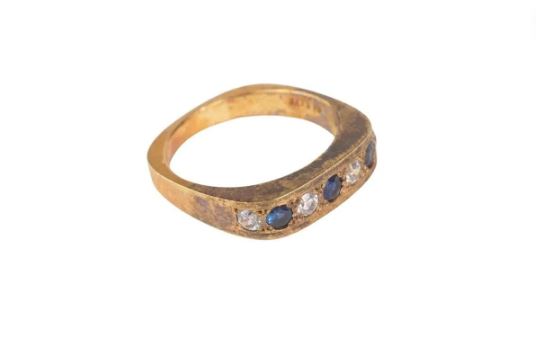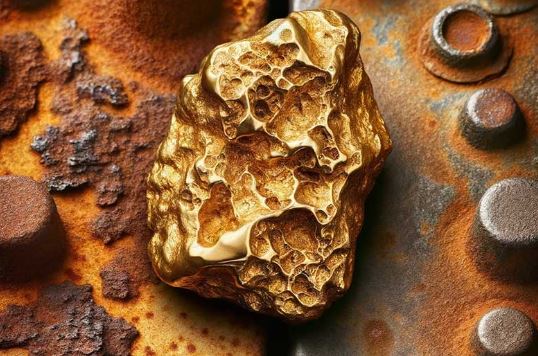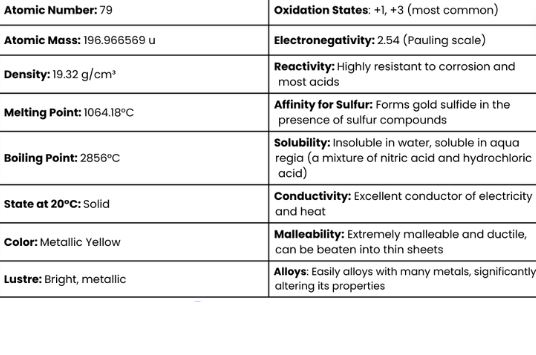Have you ever wondered if gold is capable of rusting or tarnishing? In this guide we answer questions like whether or not gold rusts, how to prevent rusting, and why it happens.
Does Gold Rust?
No, gold does not rust. Corrosion is the result of the oxidation of iron and its alloys such as steel that produce a reddish-brown rough layer on the surface. Gold is highly resistant to corrosion and oxidation, making it one reason why it has been valued by people through history for its durability and permanence.
Comparing Gold Tarnish and Gold Corrosion
Tarnishing of gold and corrosion of gold are different processes, however, both of them include alteration of appearance and its parameters.
Gold Tarnish:
Tarnish refers to the gradual darkening or discoloration of the surface of gold, which usually is due to exposure to moisture.
Gold tarnish is typically the result of a thin layer of gold sulfides or gold oxides forming on the surface.

Sometimes tarnish can be removed by cleaning methods that bring back the original shine of the gold.
Gold Corrosion:
Corrosion is the slow process of degradation of a material as a result of reactions with the environment.
Gold has a high resistance to corrosion in most environments, but can be corroded in very slow speeds under special conditions.
Gold can be corroded in cases involving strong acids or a chemical reaction with the surface of gold.
Different from tarnish on the outer shell, the corrosion process deteriorates the whole structure of the gold. However, this is extremely rare and happens only under the extreme conditions.

How to Prevent Gold from Rusting or Tarnishing
To prevent gold from tarnishing or corroding, you can take several precautions to minimize its exposure to factors causing these processes:
Store Properly: Store gold items far from heat (especially sunlight!) and keep them way from moisture and strong temperature fluctuations. Also, consider anti-tarnish bags or cloths that are made specially for storing jewelry.
Avoid Chemical Exposure: Do not keep gold at the touch of chemicals like chlorine, bleach, and ammonia, as they tend to be damaging or corrosive. Dislodge the gold necklaces and earrings before you jump in a pool or use ozone-generating products at home.
Regular Cleaning: Gold should be washed gently by hand once a week in lukewarm water. Treat the surface with a soft brush removing acid and salts that are accumulated and on the surface and can cause tarnishing.
Avoid Abrasive Materials: Instead, apply only soft materials to reach the actual surface and devoid of aggressive cleaning methods. These can cause scratches or damage the metal thus increasing the chances that it will oxidize and corrode.
Professional Maintenance: Think about getting your gold items to be professionally cleaned and inspected at regular intervals. These services can also attend to the problems if the gold item is tarnishing or corroding as these appear.
Protective Coatings: Some gold items may have protective coatings applied to them that inhibit the objects from yellowing and corroding chemically.
Understanding Gold Resistance to Rust
Rust in Gold Bars
Principally gold blocks, as they composed, don’t rust like the iron or steel do. Though gold bars don’t throw iron corrosion, yet they can get damaged through other corrosive action or surface discoloration over time.
Rust in Gold Coins
A gold coin is like a gold bar, that is, it does not rust. Nevertheless, gold coins can still suffer attack by the “other” forms of corrosion or surface area changes. Coin materials such as gold modifications as tarnishing, surface Contamination, and environmental aspects influence the coins’ appearance through time.
Gold Jewelry Rusting
Gold jewelry is the least susceptible to changes in appearance through color alteration. However, other factors like discoloration and surface tarnishing can still result in relatively noticeable changes in the appearance of the jewelry

Why Gold Does not Rust
Rust happens when a metal, for instance iron, gets into a chemical reaction in the presence of oxygen and moisture.
Pure gold does not undergo rusting because of various reasons including chemical stability, inertness and lack of oxidation.
FAQs
Can Gold Rust in Salt Water?
That fact that gold doesn’t rust, even in corrosive environments including salt-water testifies to its durability. In salt water, the corrosion resistance of gold is particularly marvelous. Gold jewels salvaged from wrecked ships that lay on the ground for centuries in literally salted environments can stay stunningly intact.
Does Fake Gold Rust?
Unlike true gold that cannot rust in the same away as iron or steel, when the base metals of the fake gold items are exposed, corrosion and chemical reaction might take place.
Does Gold Tarnish?
Yes, gold will at some point get tarnished. However, it takes along time to tarnish depending on how well you maintain and avoid exposure to corrosives.
Will Gold Rust in Water?
Gold gives an immune response to corrosive agents in most environments, principally water. It is quite persistent in water or atmosphere due to its resistance to oxidation and hydrolysis, even protracted periods of exposure. Hence, they will not rust when left in water around 3,000 meters below the surface of the oceans
Will Gold Rust Over Time?
Pure gold can not and will not rust even for a very long time. However, when other elements like iron are present in gold making it impure, rust may happen.
Does Gold Rust in Chlorine?
Pure gold does not get affected by chlorine, it only gets affected or rust if there are impurities in the gold that will undergo oxidation.
Does Gold Rust or Corrode?
Generally, gold doesn’t rust or corrode easily. However, with impurities in it or when continuously exposed to corrosive chemicals it may corrode over a long period of time.
Does Real Gold Rust?
Although the purest of gold remains resistant to tarnishing, it is absolutely vital to care for gold jewelry made with alloys to reduce tarnishes. The consistent cleaning and storage that meets the standards can assist one to retain the original appearance of their gold Jewelry and protect it from becoming dull.
Does 14k Gold Rust?
Pure gold can never rust since it does not go through oxidation. However, 14k gold is not pure due to the presence of other elements like silver and copper which may tarnish or rust with time.
Does 18k Gold Rust?
18k gold may not rust like iron does. However, it does rust after a period of time due to the extra elements in it like copper or silver.
Does White Gold Rust?
White gold is not really pure gold because it consists of more elements including silver, nickel and palladium. All these elements are resistant to rusting making white gold rust-resistant.
Conclusion
Generally, from the discussion above, it is safe to conclude that pure gold does not rust because it doesn’t undergo oxidation. However, impure gold does rust or tarnish over a long period of time.
More resources:
Is Gold Alloy Magnetic – Source: KDM
Is Gold Magnetic – Source: KDM
Does Tungsten Rust – Source: KDM
Does Copper Rust – Source: KDM
Does Titanium Rust? – Source: KDM
Does Zinc Rust – Source: KDM
Does Silver Rust – Source: KDM




